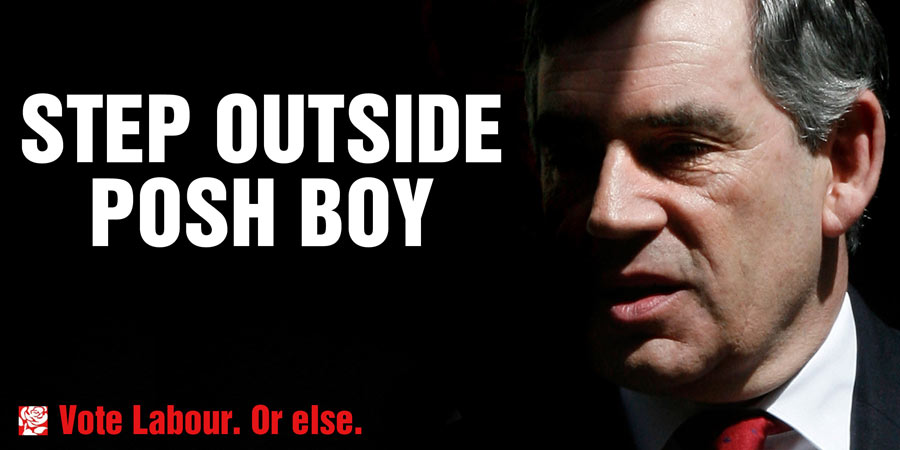Thursday, 29 April 2010
Electoral reform essential but no panacea
"The existing system, which depended on a now stifled internal democracy in the main parties, has been breaking down for years. Eventual electoral reform of some kind looks increasingly probable, even if it is unlikely to be the political and social panacea some on the centre-left seem to believe. Judging from experience elsewhere, it could just as easily entrench a new bloc of Liberal Democrats, New Labour and Cameron-style Tories as deliver the genuine political choices and pluralism they want.
But what is absolutely clear is that the only way they are going to get it is through a Labour-Liberal Democrat administration. It's not just that David Cameron has set his face against holding a referendum on the subject; it is increasingly doubtful that he could get his MPs to vote for one even if he conceded it as the only way to get the keys to No 10."
Sunday, 18 April 2010
Scale and duration of bank-bailout cuts becomes clearer
"In a stark warning to MSPs, Audit Scotland says the ring-fencing of specific areas – which is promised by most parties in the election – is a “missed opportunity” to reform services and will only worsen the depth of cuts elsewhere.
Its warning, in written evidence to the Finance Committee at Holyrood, is echoed by the leading independent experts in the field.
The Chartered Institute of Public Finance and Accountancy says “radical thinking” is vital as public spending is slashed in the wake of the banking crisis, with some services “almost certainly being restricted or even withdrawn”.
The body suggests the Government may have to focus on delivering “guaranteed minimum core” services, with charges for additional “options”.
According to the latest estimates, Scotland is facing real-terms cuts of 3%-4% each year until 2013-14, against average real terms increases of 5% a year in the first decade of devolution.
Around a third of Scotland’s £34 billion budget goes on health and another third on council services, including around £4.5bn on education. Wage costs account for 50% of the spending, so deep cuts will inevitably mean job losses.
Chancellor Alistair Darling has warned that the measures needed to cut the UK’s £1 trillion national debt will be “tougher and deeper” than under Margaret Thatcher in the 1980s.
However, in the election campaign, parties are promising to exempt swathes of public spending. Only the Liberal Democrats’ Treasury spokesman, Vince Cable, has said no area is sacrosanct.
Labour says it will “protect frontline spending on childcare, schools, the NHS and policing”, while the Conservatives have promised to ring-fence spending on overseas aid and the NHS.
The SNP is campaigning to “protect frontline services”, but is coy on detail.
Audit Scotland says public bodies “have difficult decisions to make” and “future reductions in public spending will be very challenging”, with the least painful efficiency savings already made.
Asked by MSPs if any area should be ring-fenced, the watchdog said: “Excluding any specific sector, policy area or services from the requirement to deliver services more efficiently represents a missed opportunity and could significantly increase the pressure for other spending areas to find savings.”
Audit Scotland also stressed that efficiencies alone cannot cover the cuts required, and said a sense of “urgency and realism” was required.
In a separate committee report, the Centre for Public Policy for Regions (CPPR) at Glasgow University has warned that the coming years will be difficult for Scottish politics.
“A Parliament that has not been used to real terms cuts in budgets, but rather to relatively large year-on-year increases, now faces one of the most sever fiscal contractions in modern history. Furthermore, this downturn in funding prospects will be long-lasting.”
It says strong leadership is needed “to make the unpalatable seem inevitable” and reduce the risk of “social unrest”."
Friday, 16 April 2010
Malcolm Tucker's "rising tide of yellow piss"
But of course Peter's done his polling analysis and his futurology. That's why he's relaxed, perhaps not intensely, about the Lib Dem "surge". It looks like the Tories lose say 2 for 1 Labour on % points if the Lib Dems rise, and possible even more in seats. Makes it ever harder for the Tories to even be the biggest party, never mind win a majority.
And curiously, if the Clegg rise was sustained - of which there is no guarantee - Labour could end up with a smaller share of the vote of all 3 but the largest share of seats. Then we'd be not just in AV-referendum territory, but the LibDems would want to push for further more proportional PR. That's going to be an interesting game of brinkpersonship. And the outcome of the following election if held on a new voting system - whether some form of AV or STV - which may be comparatively soon, will be even more interesting.
Even if the LibDems cool down again, it is a strong possibility, even probability, that this election will deliver a decisive hung parliament which then implements electoral reform, which ultimately could keep the Tories out of power more or less permanently. No bad thing in itself. Would this be the end of New labour too? and would it have been a success in its own terms?
Interesting times.
Wednesday, 14 April 2010
Brown admits "mistake over bank regulation"

"In the 1990s, the banks, they all came to us and said, 'Look, we don't want to be regulated, we want to be free of regulation'."
"All the complaints I was getting from people was, 'Look you're regulating them too much'. And actually the truth is that globally and nationally we should have been regulating them more," he added.
"So I've learnt from that. So you don't listen to the industry when they say, 'This is good for us'. You've got to talk about the whole public interest.'"Ah well, lesson learned, eh? But "All the complaints from people"?





